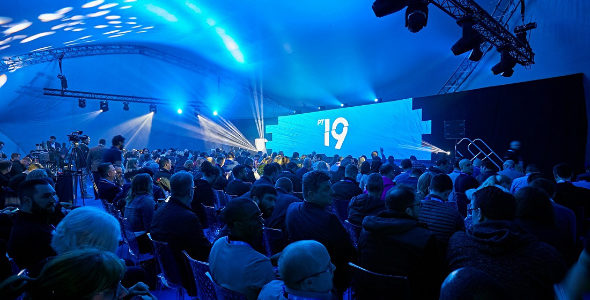
Pure Technology Group have set their sights on leading rather than following in the market. At their recent customer event in Wakefield, pt19, they treated 800 tech professionals, including their customers, to a bevy of cutting-edge technology. In this piece Cliff Fox, Group COO, spoke to Comms Business about where the MSP is heading.
In just 11 short years Pure Technology group has gone from a standing start to £33m in revenues. Their cloud service business is the core of the company (15,000 seats on Microsoft in 2018) but they aren’t stopping there. The last two years has seen them add VR, AI and now IoT to the portfolio.
Comms Business Magazine (CBM): You appear to be ahead of many partners when it comes to VR (Virtual Reality). What made you decide to jump into this technology ahead of the crowd?
Cliff Fox (CF): That comes from a strong intention to lead and not follow. Being an IT service partner, it is hard to differentiate yourself because most people do the same ‘stuff’ from the same global organizations. We do that too, but its about how you get a head start on what is next and what is coming up. That’s really important to us and it’s important to our customers. If we can spot a new piece of technology which is going to make the difference for them and do the leg work by testing it and seeing if it really does what it needs to then it is value for cusotmers.
We launched pureVR 6-8 months ago and that wasn’t because people were banging on our door saying they wanted VR. We just saw certain applications in mixed-reality which we thought will make a big difference to an organization. We actually use it ourselves. We developed a pureVR app for HR inductions. Every business on the planet does inductions in some shape or form and we are not taking away the personal touch on that but we are augmenting it, we are adding to it. For example, if you are doing an induction and the CEO isn’t there, they can be virtually. It just makes it more consistent and it saves the HR people some of the legwork. We’ve done it, its low cost and really easy to do and we content curate everything around it.
I’ve been really proud of what we have done on VR because we coded it ourselves. That was our first foray into development. The guys wo worked on that, it was all new ground for them. I’m a techie at heart and that sort of stuff gets me going.

CBM: Tell us about pureIoT
CF: We’ve done the same thing with IoT. We have launched IoT smart spaces today and that has been a nine-month journey of finding out that all the people that are saying they are doing IoT in the Channel really aren’t! There is so much hype and smoke and mirrors around IoT it can be difficult to delve beneath. IoT itself can be a really complex supply chain from the sensor right the way through to the analytics engine. For us its about taking it apart and working out what we can do and what will work and then putting that in a box.
Smart spaces is really about utilization and making things save money, be more green, more effective etc. Take desk occupancy for example, what are your metrics for office space being used? If areas of your building aren’t being used can you drop the heating or the lighting? Can you make it more self-controlling? The ultimate is can you burn less fuel and save money.
We run out of three offices and people hot desk between the three. For us it is useful to know which building is at a certain occupancy at any one time. If we can organise that better then we can cut our bills…. It’s that simple.
CBM: These technologies aren’t at your core but a clear growth areas, where else are you seeing opportunities?
CF: If we just concentrated on the cloud provision for our customers our lives would probably be easier, but then what about things like endpoints? Most people talk about hardware being dead, its declining margins but there is a different way of looking at that. If you think 8-9 years ago you would have a £600 desktop PC and the margins would have declined over the years on that. Nowadays things are different, you have people willing to invest in a £1,800 Surface or a £1,000 smartphone, that cost equation is quite different now. We still transact in endpoint business, but we put a managed service wrap around it. Device-as-a-service is big now too.
